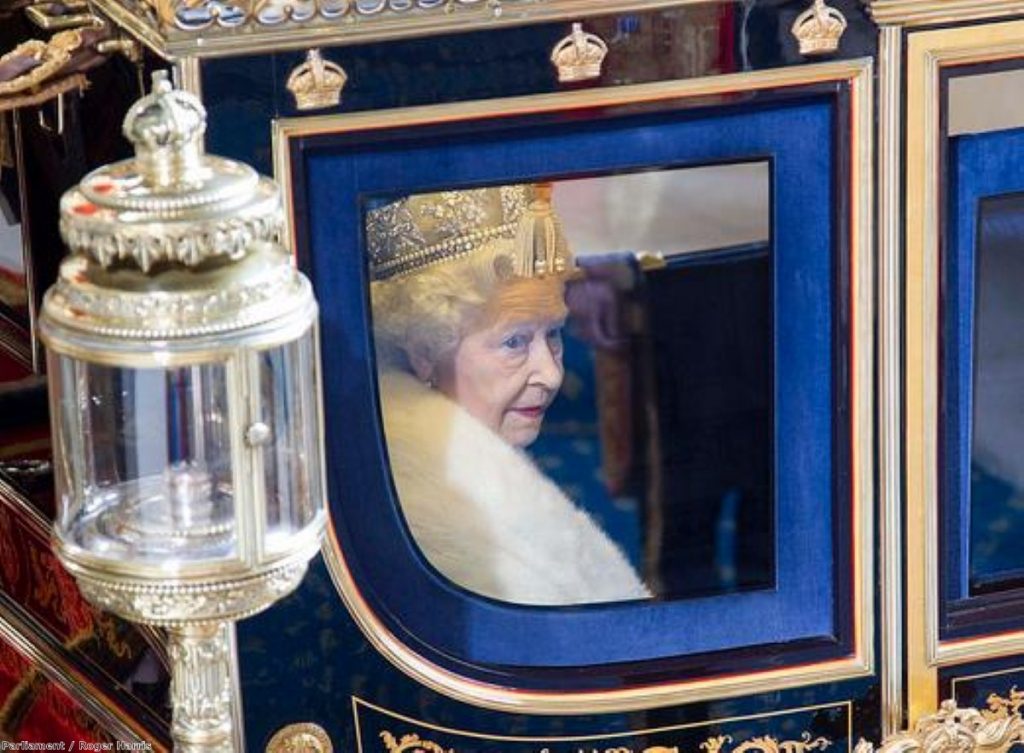Sketch: That was the weak Queen’s Speech that was
In one of his more complex jibes against Ed Miliband, David Cameron declared in the Commons chamber this afternoon: "The weak are a long time in politics."
There was a moment of silence while MPs chewed that one over. And then, rippling slowly up from the green benches, came a flurry of confusion, consternation, and finally amusement. The prime minister was being too clever by half.
It was in keeping with what came before. The first day of the Queen's Speech debate which kicks off this parliamentary session is an occasion for quips and jibes from the party leaders. Normal politics is briefly suspended by convention, as an aged veteran and an up-and-coming youngster propose and second the motion that the Commons hearts the Queen (or something). The aged veteran this year was Peter Luff, who was sacked by Cameron in last autumn's reshuffle. He got his own back by pointing to the "old Etonian" on the frontbenches (he meant the chief whip, but it was obviously a jibe) and quoting Churchill. "There is only one thing worse than fighting with allies, and that is fighting without them," the war leader was supposed to have said. Again, another awkward pause, as MPs wondered whether Luff might just have been calling for a potential tie-up with Ukip.
Luff's speech was well-received, but behind the polite smiles was a subtext of icy tension. Cameron affectionately pointed out Luff was so determined to be a politician he had even changed the nappies of his ex-boss' son. The baby in question subsequently ended up being elected as the MP for Worcester in 2010. Cameron, in witty mode, observed drily: "This goes to show all political careers start at the bottom."


I laughed at this. There is something about the atmosphere in the Commons chamber which lowers the bar for humour. What would be met with rotten tomatoes on any stand-up circuit in the country is judged the height of humour when uttered in politics. Perhaps it's just because politicians are usually so boring that the contrast is particularly extreme.
Luff was followed by the young rising star, Stephen Williams, who referred to his leader as "Cleggzilla" (Cameron thought that was an "interesting career move") and revealed that he was a strong supporter of the coalition's gay marriage legislation. But alas! "I am waiting for my own Prince Charming so I can take advantage," he said sadly. MPs responded en masse with a gameshow "ahhhh" of sympathy, smiling all the while.
After these very odd preliminaries came the main event. Miliband, having got a big laugh for telling a story about Williams being a typical Lib Dem and not revealing to protesters which way he'd vote on tuition fees, suddenly started being political. Cameron reached for a glass of water. So it began.
Tory MP after Tory MP stood up to try and put Miliband off. They did a fair job, especially on the issue of the Labour leader's calamitous spending position. "Of course a temporary VAT cut would have a cost," he said, as Ed Balls shrugged theatrically beside him. Miliband's conclusion was actually a very astute one, I thought. "You can't out-Farage Farage," he told Cameron. Sometimes you can find useful advice in the most unlikely of places.
Not that the prime minister was looking for it. He set about attacking Miliband and defending the coalition's approach to the economy. We had heard it all before, so I stopped listening and started concentrating on the heckling of Ed Balls. "It's flatlining," he observed, doing his trademark DJ-scratching-record gesture. "It's flatlining," he repeated, as Cameron kept on going. "It's flatlining," he said again, starting to get exasperated. "It's flatlining." And then, in an unexpected variation, he observed: "It's totally failing." That made no difference. So he continued where he had left off. "It's flatlining." No wonder he drives the government frontbenchers up the wall.
It was towards the end of his speech that Cameron called Miliband "weak". He accused the leader of being in hock to the shadow chancellor, which set Balls and Miliband off on completely different, utterly uncoordinated pantomime conversations with each other. It created an impression of chaos, like a Punch and Judy show gone wrong. I imagine this is what shadow Cabinet meetings are like. This was a weak Queen's Speech, but yet again the opposition somehow conspires to make itself the centre of derisible attention.












